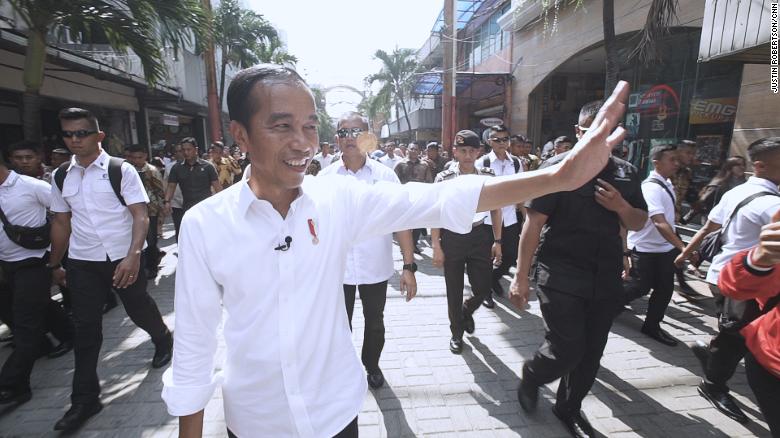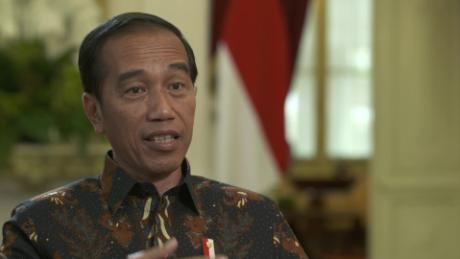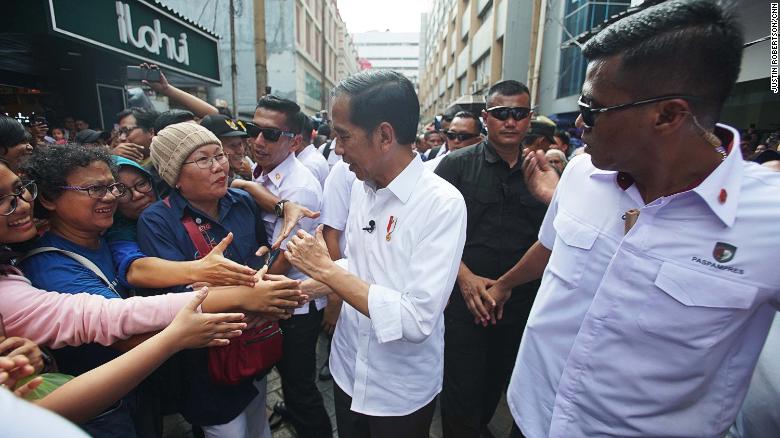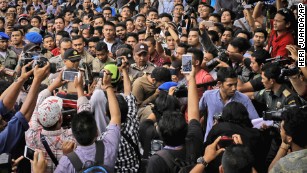President Joko Widodo says Islam in Indonesia is 'tolerant' as rights groups warn of rising fundamentalism
In his first international television interview since being re-elected in May, Indonesian President Joko Widodo denied being concerned about the rise of fundamentalism in his country, saying that the Islam practiced there is tolerant and progressive.
"I still believe that Islam in Indonesia is a tolerant and moderate Islam. Islam in Indonesia is modern, it is forward thinking," said the leader, who is popularly known as Jokowi -- a nickname he said was given to him by a French businessman while he was working as a furniture salesman.
In his second term as leader, Joko faces an uphill battle of uniting the world's most populous Muslim nation, and fighting what he calls "hoaxes and fake news that influenced the mind of the people."
"We now have to restore the situation and work together to build this country," he said, at the Merdeka Palace in Jakarta.
Joko's comments came after a bitter electoral race against his longtime rival, former general Prabowo Subianto, who refused to accept the election result, alleging widespread ballot-rigging that sparked deadly clashes in the capital. The Constitutional Court subsequently threw out Prabowo's bid to overturn the result, calling it "legally groundless."
Putting their differences aside, the two political rivals earlier this month vowed to work together. Pointedly, their first face-to-face meeting after the heated contest took place on the country's inaugural metro line (the MRT) -- one of Joko's first-term infrastructure wins.

Indonesian President Joko Widodo greets people at the Pasar Baroe shopping center in central Jakarta.
No compromising values
Five years ago, Joko won the presidency on a promise to increase jobs, crack down on corruption and bolster human rights. But during his re-election campaign, he embraced elements of Indonesia's religious right.
His running mate was conservative cleric Ma'ruf Amin, who supports Sharia law and believes that homosexuality should be criminalized. Amin is now Indonesia's vice president. That was seen as an effort to eat into Prabowo's conservative support base and appease those who claimed he was not Islamic enough.
Joko denied that he befriended hardliners to win the election, suggesting his outwardly secular values had not been compromised.
"We would like to work with all elements of society. We would like to work with everyone to develop this country, but not with those who want to ruin this country in terms of its ideology and in developing our economy. There is no compromise for me," he said.
Joko called Amin a "moderate Muslim" and said it was logical to have a cleric running mate in a country that has the largest population of Muslims in the world.
"I'm not going to change," he said. "I will not change what I believe."
Rising intolerance
While the President upholds that Indonesia is a tolerant and diverse society, rights groups say there is rising intolerance from hardline religious groups, especially against religious minorities and the LGBT community.
In 2016, Jakarta's Chinese Christian governor (a Joko ally) Basuki Tjahaja Purnama, better known as Ahok, was accused of insulting the Quran and jailed on blasphemy charges. Massive rallies calling for his jailing paralyzed the capital.
Ahok was released in January after serving just under two years in jail, but the incident showed religious fundamentalism to be a powerful force.
Discrimination against LGBT people was already intensifying during Joko's first term, fueled by what Human Rights Watch (HRW) said was "government-driven moral panic."
In Indonesia, homosexuality is not illegal apart from in ultra-conservative Aceh province, which observes Shariah Law and publicly flogs those found guilty of having homosexual sex.
'Never seen anything like this': Inside Indonesia's LGBT crackdown
In May 2017, a police raid on a gym and sauna led to the arrests of 141 people in a single night because of their presumed sexuality. But Human Rights Watch reported that police raids and vigilante attacks led to the arrests of at least 300 people that year -- the highest number ever recorded in Indonesia.
A number of high-profile Indonesian politicians, including several government ministers, have unleashed anti-LGBT rhetoric and a parliamentary proposal still being debated would criminalize gay sex and extramarital sex.
In its World Report 2019, HRW said that while Joko's administration "took small steps" in 2018 to protect the rights of "some of Indonesia's most vulnerable people" more could be done.
"Although Jokowi issued a plea for religious tolerance in his annual State of the Nation address on August 16, his administration has failed to translate his rhetorical support for human rights into meaningful policies during his first term in office," the report's authors said.
On this issue Joko is noncommittal, suggesting that because Indonesia is a predominantly Muslim country, its Muslim citizens would not accept greater rights for LGBT people. A 2013 Pew survey found that 93% of the country refused to accept homosexuality.
"Tolerance in Indonesia, we can see. Everybody has good tolerance. However, when it comes to regulations and laws, I can ensure you, there will be major rejection by the people," he said.
'No tolerance for terrorism in Indonesia'
While the LGBT crackdown was driven in part by Islamic hardliners, Joko said he is not worried about the rise of religious fundamentalism in Indonesia.
In a country of 267 million people, spread across 17,000 islands it is normal to have "two, three, four percent of people who are hardliners," he said.
"It is the obligation of the country to know how to embrace them. So that (is) the goal of this country: to become an opulent, just and prosperous country," he said.
But that embrace became a political flashpoint recently when Abu Bakar Bashir, a radical Islamic cleric and the alleged mastermind behind the 2002 Bali bombings, was granted early releasefrom jail on humanitarian grounds.
Following an enormous backlash -- from liberals as well as hardliners -- Joko backed away from the plan. Bashir remains behind bars and on his fate Joko is now unwavering. "The final decision was no," he said.

Widodo: We must conduct reform on a massive scale
The threat of homegrown terrorism remains. In May 2018, a spate of deadly, ISIS-inspired bombings rocked Indonesia's second-largest city Surabaya, targeting churches and the police.
Returning Indonesian ISIS fighters also present a new challenge to the country's law enforcement and intelligence agencies. Police reportedly foiled an attack just before the election, arresting at least nine fighters affiliated with ISIS -- at least six of whom were known to have fought in Iraq and Syria, police said.
Joko said his counter-terrorism forces -- known as Detachment 88 -- have a two-pronged approach.
"There are certain cases where we can embrace them, and return them to normalcy. But, if it is hard to do, then the hard approach is done through strict law enforcement. We do not tolerate terrorism in Indonesia," he said.
Joko said deradicalization programs were working.
"Major terrorists have returned to society, established foundations to embrace ex-terrorists who can live normally. That is the success of deradicalization in Indonesia," he said.
Growth and development a priority

Indonesian President Joko Widodo greets people at the Pasar Baroe shopping center in central Jakarta.
But Joko's focus remains on the economy and on Indonesia's development.
During his first term, Indonesia's economy grew at just over 5% per annum -- shy of the 7% promised, but enough for the country's GDP to surpass $1 trillion in 2017. The IMF believes that with economic reform and investment, Indonesia's economy could grow by 6.5% by 2022.
To achieve that goal, Joko said: "We must conduct reform on a massive scale."
That means teaching workers new skills, introducing tax reform and attracting investment and building the large-scale infrastructure projects that have become a hallmark of Joko's presidency.
The latter will involve Indonesia's biggest trading partner: China. After the election, the government signed deals worth billions of dollars with the Chinese government for major infrastructure projects as part of Beijing's flagship Belt and Road initiative. And this month Indonesia reportedly asked China to set up a special Belt and Road fund after offering $91 million in projects, according to Reuters.
But reports suggest that smaller nations are being saddled with debt from these huge Chinese mega-projects and one concern is that China will be in a strong position to influence their strategic decisions if they default.
Joko said Indonesia won't fall prey to the so-called "debt-trap diplomacy" problem, because the deals made were business to business, he said, and will "benefit the national interest of Indonesia."
Meanwhile, on July 11, 22 countries, including Japan and the United Kingdom, issued a joint statement condemning China's mass detention of Uyghur and other minorities in the country's Xinjiang region.
Indonesia -- the world's most populous Muslim nation -- was not a signatory.
While Joko said he "continues to monitor problems in China" with regards to Uyghurs, "To be frank, I do not have enough data about that," he said.
News Courtesy: www.cnn.com












